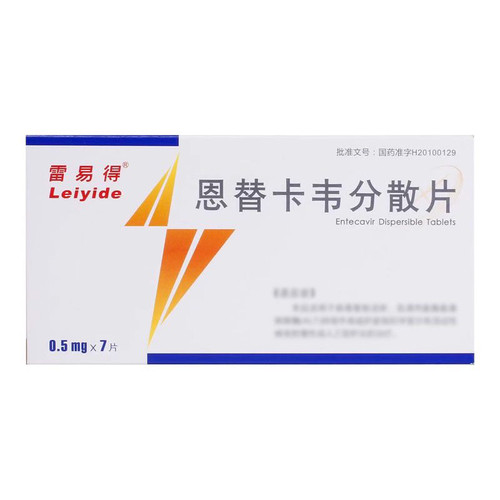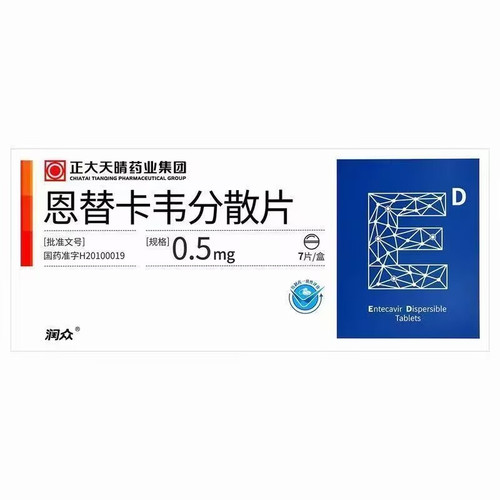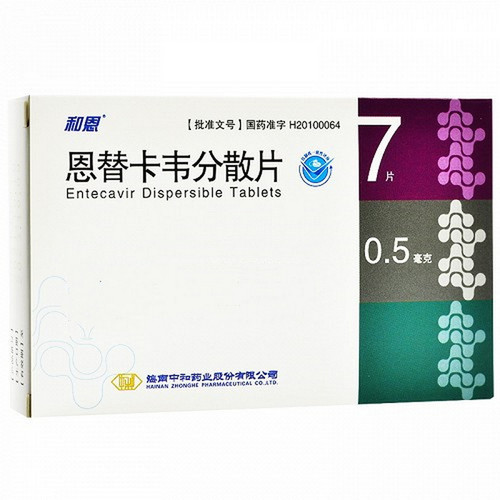Product Overview
[Drug Name]
Generic Name: Entecavir Dispersible Tablets
Trade Name: Refuven Entecavir Dispersible Tablets 0.5mg x 21 Tablets
[Main Ingredients]
The main ingredient of this product is: Entecavir.
[Appearance]
This product is white or off-white tablets.
[Indications/Main Functions]
This product is indicated for the treatment of chronic hepatitis B in adults with active viral replication, persistently elevated serum ALT, or active liver histological lesions.
[Specifications]
0.5mg x 21 tablets (new packaging)
[Dosage and Administration]
This product should be taken under the guidance of an experienced physician. Recommended Dose: Adults and adolescents aged 16 years and above should take 0.5mg orally once daily. For patients who develop viremia or lamivudine-resistant mutations during lamivudine treatment, take 1mg (two 0.5mg tablets) once daily. This product should be taken on an empty stomach (at least 2 hours before or after a meal).
[Adverse Reactions]
Adverse reactions were evaluated based on four global clinical trials: AI463014, AI463022, AI463026, and AI463027, as well as three clinical trials conducted in China (AI463012, AI463023, and AI463056). A total of 2,596 patients with chronic hepatitis B were enrolled in these seven studies. In studies comparing entecavir to lamivudine, adverse events and laboratory abnormalities were similar between entecavir and lamivudine. In international studies, the most common adverse events with entecavir were headache, fatigue, dizziness, and nausea. Common adverse events in patients treated with lamivudine were headache, fatigue, and dizziness. In these four studies, 1% of entecavir-treated patients and 4% of lamivudine-treated patients, respectively, discontinued the studies due to adverse events and laboratory abnormalities.
[Contraindications]
Entecavir dispersible tablets are contraindicated in patients with a known hypersensitivity to entecavir or any of the ingredients in the formulation.
[Drug Interactions]
The metabolism of entecavir was evaluated in vitro and in vivo. Entecavir is not a substrate, inhibitor, or inducer of the cytochrome P450 (CYP450) enzyme system. At concentrations approximately 10,000 times the human concentration, entecavir did not inhibit any of the major human CYP450 enzymes: 1A2, 2C9, 2C19, 2D6, 3A4, 2B6, and 2E1. At concentrations approximately 340 times the human concentration, entecavir did not induce the following human CYP450 enzymes: 1A2, 2C9, 2C19, 3A4, 3A5, and 2B6. Concomitant administration of drugs that are metabolized by CYP450 inhibitors or inducers did not affect the pharmacokinetics of entecavir. Furthermore, concomitant administration of entecavir did not affect the pharmacokinetics of known CYP substrates. Studies of entecavir interactions with lamivudine, adefovir, and tenofovir revealed no changes in the steady-state pharmacokinetics of either entecavir or the interacting drugs. Because entecavir is primarily eliminated through the kidneys, concurrent use of entecavir with drugs that reduce renal function or compete for active glomerular secretion may increase the plasma concentrations of these drugs. Concomitant use of entecavir with lamivudine, adefovir, and tenofovir does not result in significant drug interactions. Concomitant use of entecavir with other drugs that are eliminated through the kidneys or are known to affect renal function has not been studied. Patients should be closely monitored for adverse reactions when taking entecavir with these drugs.
[Precautions]
Patients should take entecavir under the supervision of a physician and inform their physician of any new symptoms and concomitant medications. Patients should be informed that worsening of liver disease may occur if entecavir is discontinued, and treatment should be adjusted under the supervision of a physician. Treatment with entecavir does not reduce the risk of HBV transmission through sexual contact or contaminated blood. Therefore, appropriate protective measures are necessary.
[Pharmacology and Toxicology]
This product is a guanine nucleoside analog that inhibits hepatitis B virus (HBV) polymerase. It is phosphorylated to its active triphosphate, which has an intracellular half-life of 15 hours. By competing with deoxyguanosine triphosphate, the natural substrate of HBV polymerase, entecavir triphosphate inhibits all three activities of the viral polymerase (reverse transcriptase): 1. HBV polymerase initiation; 2. Reverse transcription of pregenomic mRNA negative strand; and 3. HBV DNA positive strand synthesis. Entecavir triphosphate exhibits weak inhibitory activity against cellular α, β, and sDNA polymerases and mitochondrial γDNA polymerase, with Ki values ranging from 18 to greater than 160 μM.








